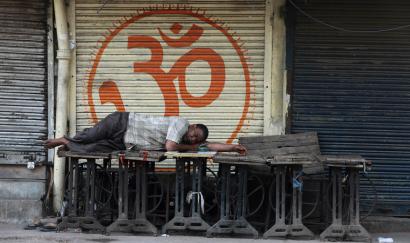NEW DELHI, Dec 26: The year 2020 is finally coming to an end but will surely leave behind deep scars in the lives of many people, particularly the small wage earners, daily wagers, domestic workers, rickshaw pullers and even cab drivers.
Those who thought that the demand for domestic help is ever-growing or an increasing number of people have started opting for hired cabs than owning their own cars, the Corona pandemic has rudely made them to realize that the life-style is changing and these jobs are expendable.
The virus may have affected all classes but the economic fallout of the Covid-19 pandemic was particularly devastating for those in the informal sector who found themselves on the streets, without their livelihoods and sometimes without their homes too. They have long battled job insecurities and temperamental employers but 2020 was particularly tough for them both from income point of view and social exclusion, they were feared to be the super-spreaders of the virus and ordered to keep a distance.
“The economic crisis of the proportion of contraction of more than 20 per cent in the second quarter and potential livelihood losses leading to approximately 400 million people sliding back into poverty, according to ILO, warrants a radically new model if we are sincere about ensuring a minimum floor of dignity for every citizen of the country,” said Oxfam India CEO Amitabh Behar.
The report quoted many erstwhile domestic helps or daily wagers to drive home the point that in the last eight months they have come to the streets without any earnings and instead the burden of debts ever rising. In addition, they also suffer from social exclusion because many household refuse to keep domestic helps or hire rickshaws and even cabs fearing contacting the virus from them. Even after the lockdown was relaxed and some economic activities re-started, the lives of the small wage earners have not changed, many people are still wary of them because they live in slums or shanty chawls sharing wash-rooms with other neighbours.
According to Behar, the pandemic-led crisis has accentuated the “inherent obscene inequality of our economic model” and there is need to recognise this and reboot a fundamentally different economic model to ensure a just and green future.
Poonam Muttreja, public health expert and executive director of Population Foundation of India (PFI), said Covid-19 was far bigger than just a health crisis. The pandemic and subsequent national lockdown has resulted in a health, social and economic emergency that is nothing short of a catastrophe.
“The economic crisis has had a significant impact on informal workers. Almost 90 per cent of workers in India work in the informal economy — that part of the economy which thrives on daily work, and daily cash, with little provisions of employment protection. Like demonetisation, the current lockdown has exposed millions of workers and their families to starvation and very bleak future prospects,” Muttreja said.
She said the impact on vulnerable populations, particularly women, was profound. “Domestic workers, a vast majority of whom are women, have been placed on unpaid leave since the pandemic began, due to hygiene issues raised by their employers and are concerned about making ends meet,” she said.
Going forward, the government must ensure income support to families of those working in the informal sector so that they are able to sustain themselves.
“Support could also include cash transfers, food or in-kind distributions, as well as distance support (e.g. radio campaigns) to raise awareness and listen to their needs. Specific measures should be designed for women workers. Increased investment in education and vocational training for women is imperative as it can lead to higher female labour force participation in the formal sector in the long run,” Muttreja said.
(Manas Dasgupta)

